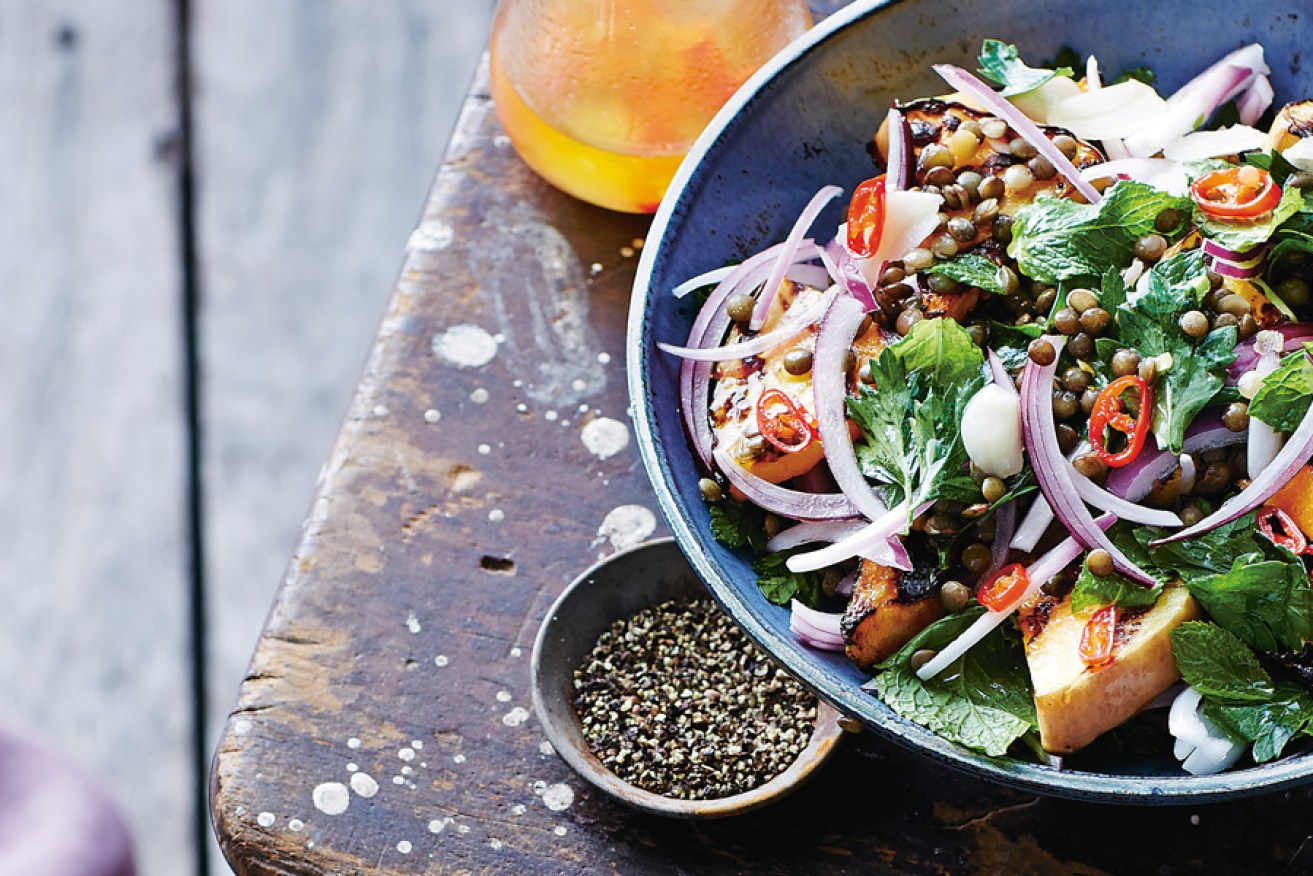What you really should be eating

Unprocessed vegetables and high-fibre foods like lentils should be diet priorities. Photo: Murdoch Books/AAP
Okay, okay, enough already – who knows what to eat anymore? We keep getting told so many different and conflicting things.
Each week, a bewildering amount of information is released about what we should eat, but a news report today about protein or carbs is likely to be contradicted next week by a report saying the opposite.
And don’t get us started on all the fad diets.
Associate Professor in Nutrition at Deakin University Tim Crowe is sceptical of the “no sugar” diet that is all the rage.
“Our dietary guidelines have always advised to eat less sugar, but to ‘sell’ a fad diet, you need to label sugar as ‘toxic’,” he said.
Nutritionist and naturopath Kimberly Kushner also takes issue with the massively popular paleo diet, which is based on the presumed diet of early “cavemen” with a big emphasis on meat.
“I see a lot of people who come into my practice who eat this way and find themselves struggling with digestive issues largely due to a lack of fibre in the diet and too much animal protein,” said Kushner.
So how should the reasonable person respond to this glut of information?
We need take a deep breath (oxygen isn’t fattening, right?) and get a healthy dose of common sense. The New Daily has skipped the quick fixes and gathered only nutritionally sound and healthy eating advice. Here’s a sensible guide to eating well.
1. Eat regularly
According to a spokesperson for the National Health and Medical Research Council (NHMRC), regular planned meals are more likely to include necessary nutrients, whereas our go-to foods for unplanned eating are often full of salt, sugar and fat.
2. Eat until you are no longer hungry, not until you are ‘full’
“Think about your hunger and how much you are eating, if you always feel over-full after meals you may be eating too much,” said Melbourne-based sports dietitian Lisa Middleton.
3. Eat lots of plants
“If most of your diet is coming from mainly unprocessed plant foods then you have little else to worry about,” said Professor Crowe.
4. Eat less processed and packaged foods
“Processing often leads to increased content of sugar, salt, fat and artificial additives,” explained Middleton.
5. Eat whole fruits instead of fruit juice
“Juicing has been so popular,” said accredited practising dietitian and spokesperson for the Dietitian’s Association of Australia Milena Katz. “A cup of fruit juice is two to three servings of fruit, and you’re missing the fibre.”
6. Go for the two Fs – fish and fibre
According to Katz, Australians are eating a satisfactory amount of fruit, but still “need to eat more fish and we still need to have more fibre in our diet” from such foods as lentils and oats. “We’re still sitting around the 19 or 20 grams of fibre per day, when we should be up around the 30 or 35 grams per day.”
7. Don’t skip breakfast
Breakfast skippers are more likely to be tempted throughout the day and to miss out on healthy morning options like wholegrain cereals. “What we do is we just don’t eat, and we just have a cup of coffee or a cup of tea and then wait until lunch, so we kill off that first hunger feeling with something inadequate – a drink usually. And then you start getting the sugar cravings because your blood sugar is still down,” Katz explained.
8. If you’re peckish, eat some nuts
“Snack nuts are really good because they have protein and they have a lot of zinc and other micronutrients that are really important. For example, Brazil nuts have selenium, which is really hard to get in other foods,” said Katz.
9. Eat seasonally
“Choose seasonal fruits and vegetables. Foods that are fresh are likely to have a higher nutrient content,” said Lisa Middleton.
10. Invest time in your health
According to the calculations of Katz, it takes a 14-hour investment each week to manage a healthy diet, including shopping and cooking time. “Think about what you’re going to have in the next couple of days for dinner and for lunch,” she said. “If you’ve made it from scratch, it’s very unlikely that it’s going to be that unhealthy.”
11. Personalise your eating
Kimberly Kushner recommends each person seek professional advice to find out what’s best for them, and cautions that not all food advice is right for everyone. A good example is that fruit is bad for those who are fructose intolerant, and coeliacs need to dodge gluten, so generalisations don’t ring true for everyone.
“It is best to ensure you are getting the best personalised advice for your health,” she said.
12. Check the dietary guidelines
According to Professor Crowe, there is no better place for advice on healthy eating than the Australian Dietary Guidelines. “Advice on eating from other sources that deviates substantially from these guidelines should rightly be treated with some skepticism,” he said.
It’s sound advice, given that the guidelines are based on more than 55,000 scientific journal articles assessed by a team of nutrition and medical experts.
So, should we be cutting out anything completely?
The recent scares about protein and sugar might have us looking to cut whole nutrient groups from our diets. But that doesn’t seem wise.
“It is tempting to blame a particular nutrient – be it protein, carbohydrates, gluten, or sugar – for all our health ills,” said Professor Crowe. “There is no one food or food group that deserves demonising so beware of following advice that restricts whole entire food groups.”
This article was first published on The New Daily.




